How Chinese heirloom seeds can lead to climate-adapted food for future gardeners
TUCSON — Hundreds of heirloom seed packets moved from one hand to another under the shade of mesquite trees on Saturday morning at Mission Garden, a 4-acre living agricultural museum at the feet of Sentinel Peak. Gardeners, both experienced and novices sifted through baskets and boxes of seed packages to take home and grow.
The celebrities of the event were Chinese heirloom seeds collected in Mission Garden's own plots, with a history of more than 150 years of cultivation in Tucson.
The garden, run by the nonprofit Friends of Tucson's Birthplace, started its Chinese garden in 2017 with the help of community members and the Tucson Chinese Cultural Center. The group contacted community members who tend small gardens or keep seeds passed down from their grandparents, who sowed long beans, Chinese veggie melon, eggplant, napa broom cabbage, Daikon radish, angled luffa and more.
They rescued and reproduced about 40 varieties and expect the seeds to now make their way back to the community.
"We need to get them out there. That is how you preserve them," said Dena Cowan, curator of collections at Mission Garden. Cowan said these unique vegetable varieties are already adapted to the region, and the only way to make sure they don't disappear is if more people grow them, and produce more seeds.
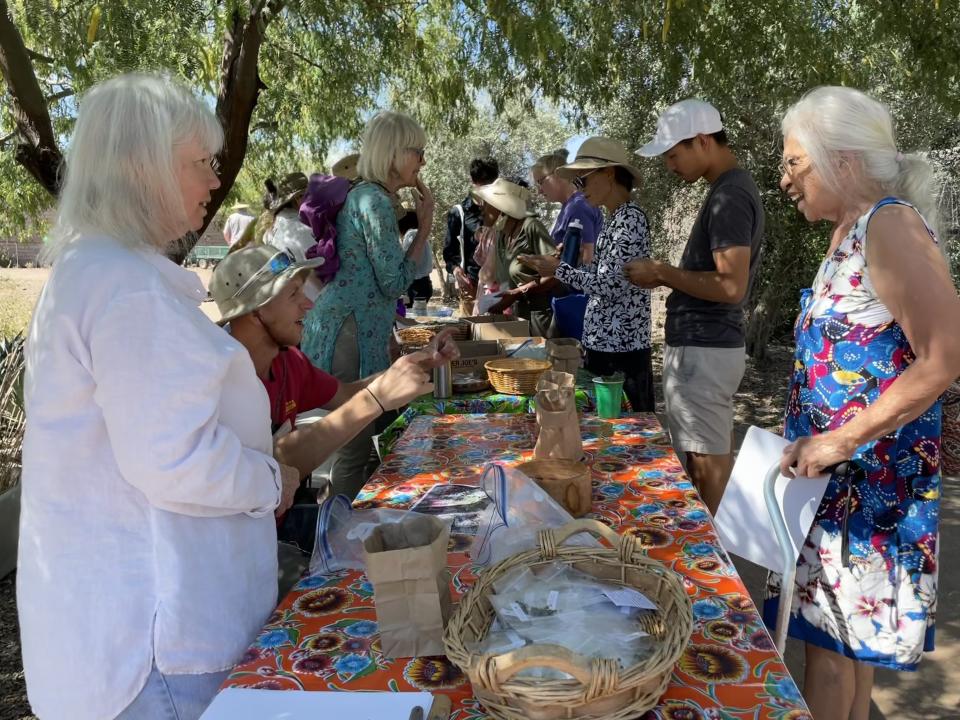
The seeds have been passed down from one generation to the next within families or communities. Mission Garden had already shared some of its heirloom seeds with school gardens and volunteers, but this is the first time the group undertook a large public seed swap and giveaway, Cowan said.
In celebration of Asian American and Pacific Islander Heritage Month, the garden partnered with Pima County Seed Library and Biblio Lotus to offer a seed swap and giveaway to the public, and share stories of Tucson's Chinese gardening history and traditions. They also offered a wider variety of seeds, not necessarily from Asian vegetables and greens varieties.
At the event, Mission Garden received seed exchanges from some attendees and made a seed donation of 21 varieties of vegetables and grains to the Pima County Seed Library. The seeds will go into the library catalog and eventually become available to all library users, said Jeff McWhorter, co-chair of the Pima County Seed Library.
First gardens grew near the Santa Cruz River
The first Chinese heirloom seeds were brought to Tucson by wage workers' families who came around the late 1870s to work in the Arizona territory mines and the Southern Pacific Railroad. Many became merchants and farmers.
"During that period vegetables weren't really selling that well, as nobody was really producing it on a regular basis. The Chinese started doing it, and selling it by wagon," said Fe Tom, a first-generation Chinese-American, Tucson-based architect, and longtime Mission Garden board member.
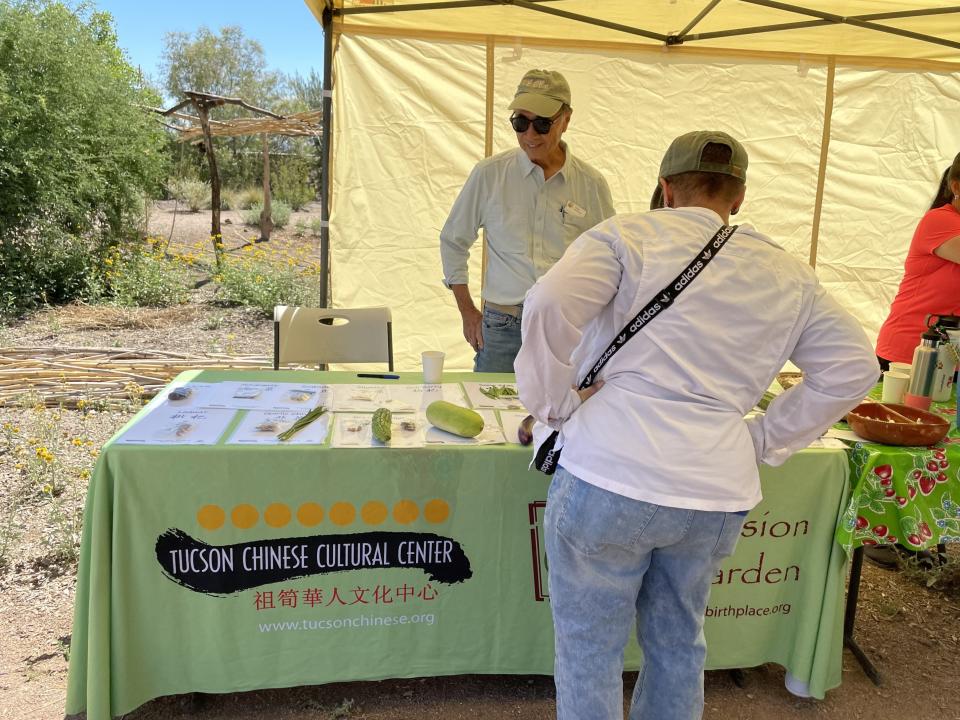
The first Chinese gardens in Tucson were built about a half mile from Mission Garden, on leased land next to the then-flowing Santa Cruz River, Fe Tom said.
Chinese grocery stores proliferated through the 1920s to the 1960s. Families grew gardens in the back of stores to sell both Chinese vegetables and greens, and other produce for Mexican and Anglo residents.
Something similar took place in Phoenix. Nancy Tom, a fourth-generation Chinese-American, grew up in a neighborhood with five Chinese grocery stores a couple of blocks from each other. She would walk with her grandmother to the different stores where they would trade seeds and vegetables among each other. Both her grandma and her mother grew gardens from heirloom seeds, on top of their regular job.
"But the kids from these stores grew up and didn't continue gardening. They all went off and became doctors and engineers, or else," Fe Tom said. "Around the 60s that was done."
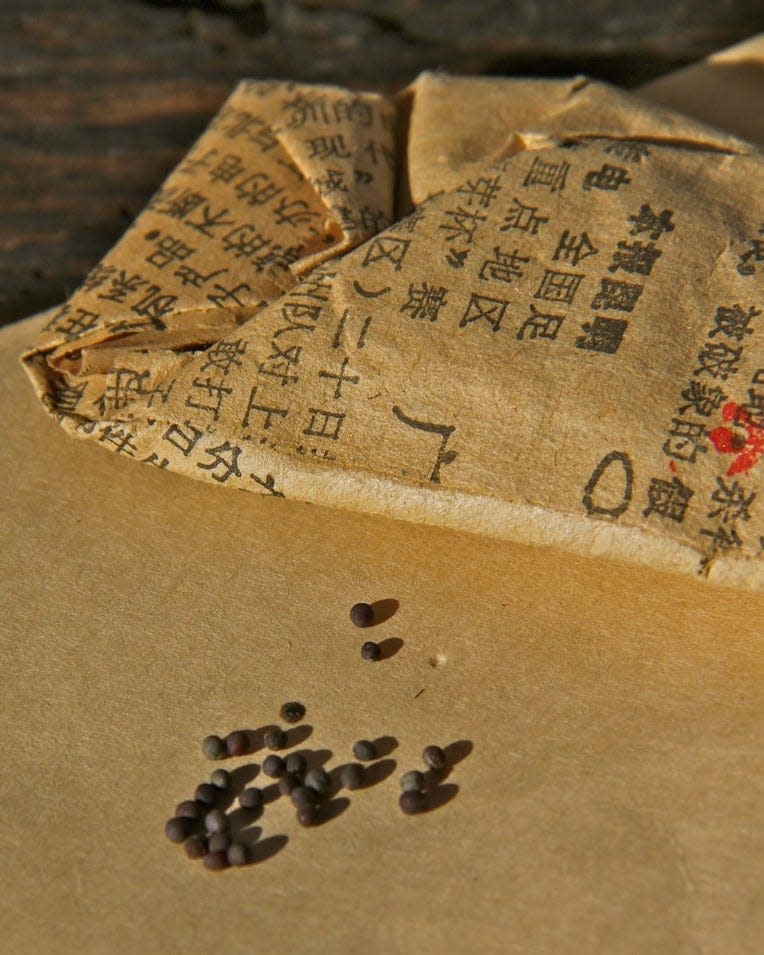
Mission Garden wanted to grow a Chinese garden. The site has a dozen plots with varieties of vegetables, fruits and grains that form a timeline of Tucson's 4,000 years of agricultural history, and represent every culture and ethnic group that has contributed to it.
Tom and Nancy, who are also board members of the nonprofit, spearheaded the effort to recover and grow the Chinese heirloom varieties in 2016.
"We approached a lot of the Chinese families that were here in Tucson to find out what kind of seeds they'd had still. Because a lot of the Chinese had stopped gardening down here," Nancy Tom said.
Growing these varieties was of special interest to them so they could educate younger generations from Chinese heritage about food and gardening traditions. The effort, garden clubs and cooking demonstrations have become popular with the general public.
"This is an opportunity to help revitalize interest," Nancy Tom said.
'Food is glue'
Biblio Lotus, the most recent of Pima County Public Library's diverse voices group, was created two years ago after library workers and neighbors expressed the need to create a space to better serve the Asian-American community. The effort was prompted by the discrimination and violence many community members experienced at the start of the COVID-19 pandemic.
"We want to share the culture and celebrate the contributions of our community," said Sharon Yang, librarian and chairperson of Biblio Lotus. "We want our children to learn about their ancestry."
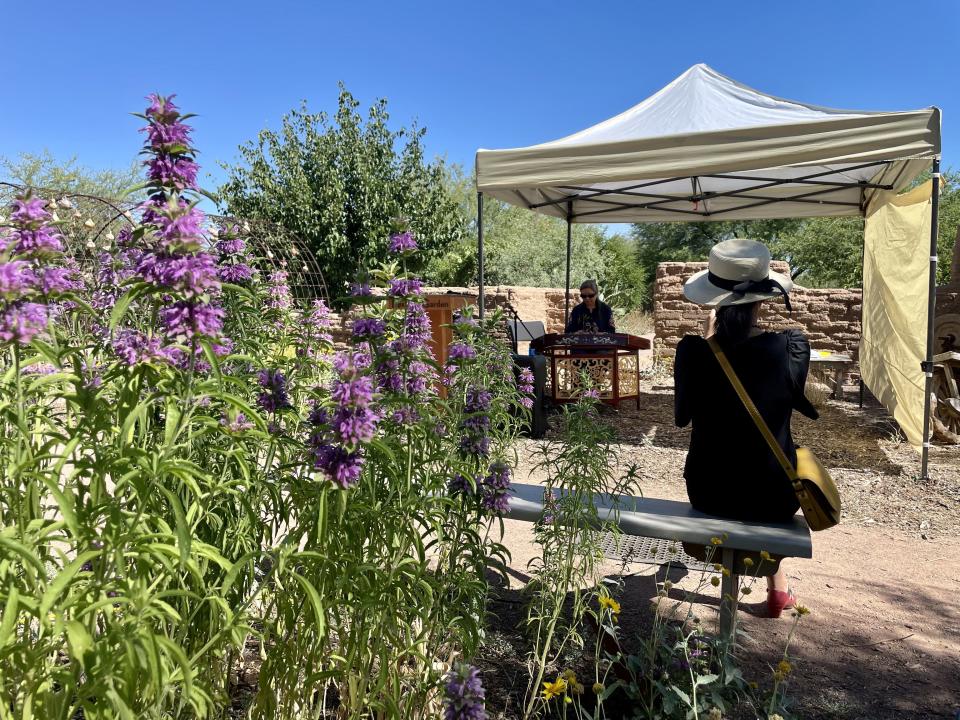
The group works to expand the library collection, highlight Asian-American authors, increase services and programs offered to community members of Asian heritage and partner with local organizations.
In collaboration with Mission Garden, the Seed Library and the Tucson Chinese Cultural Center, Biblio Lotus produced an eight-page booklet with a package of Chinese heirloom seeds and recipes gathered from Tucson families. Yang included her braised eggplant family recipe in it. The booklet also includes recipes from library patrons with heritage from India and Vietnam.
Biblio Lotus is working to get more partners from the diverse Asian community involved. The Asian population in Pima County numbered 31,367 people in 2020, not counting those who listed themselves as biracial or multiracial.
"Public libraries are for all the community, and there is a diverse population here," Yang said. "Asian communities are part of the community."
Food culture and traditions are also a way to emphasize "commonality," said Li Schmidt, a musician from Jasmine Asian Music Ensemble who performed with her colleague Nan Lan at the Saturday event. She recalled a Thanksgiving dinner where they shared food from 12 different countries.
"I feel food is glue," she said. "The cultural background is the richness of humans. It teaches us to be appreciative of others."
Sharing and sowing seeds is a matter of 'survival'
Mission Garden donated not only Chinese heirloom seeds to the public library but also climate-adapted local varieties the group has been tending for years, like Tarahumara garbanzos, O’odham pink beans, Magdalena cilantro, low water arugula, blue corn and others.
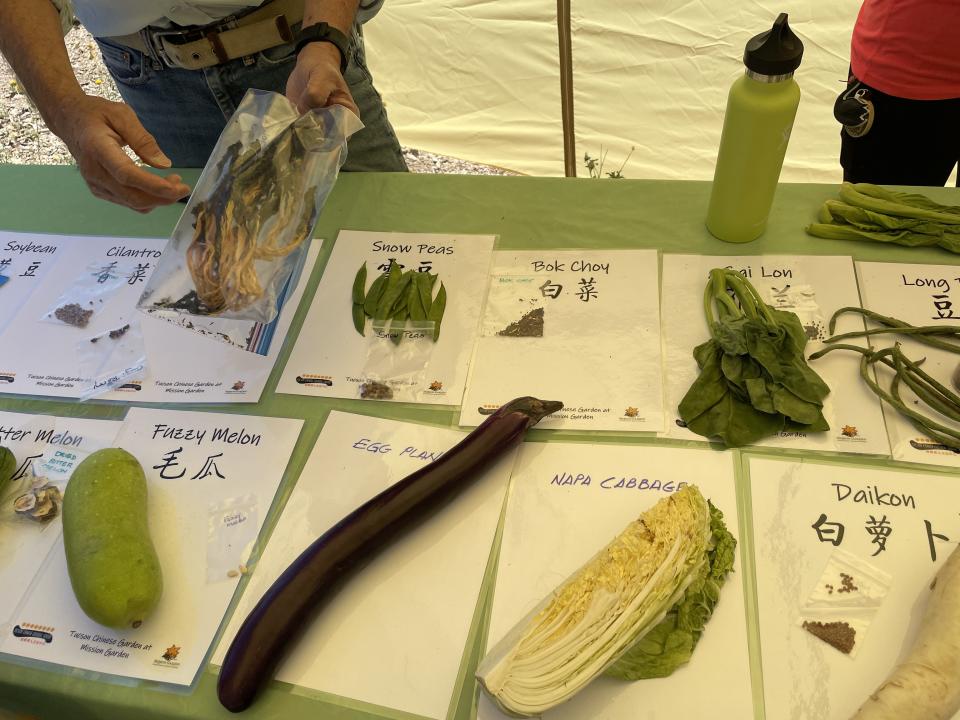
The donation adds to a catalog of over 200 varieties of open-pollinated and heirloom seeds from the Pima County Seed Library, which was created about 11 years ago. There are 19 library locations in the county operating the program and allowing library users to check-out seeds.
Although there is no requirement to make a seed-return after users sow, grow and harvest, about 30% do. The program has become incredibly popular: From January to April, over 28,000 seed packages were checked out from public libraries, said McWhorter.
The library also created larger gardens in nine library locations to start sowing and producing seeds for the catalog.
"The seeds are living things, they need to be planted, grown and re-harvested. They are not doing anyone any good by just sitting in the shelves," McWhorter said.
Kelly Wilson, a Pima County librarian and one of the founders of the program, said the importance of preserving heritage foods and seeds goes beyond culture. It is about ensuring we have foods that will grow well in a changing climate.
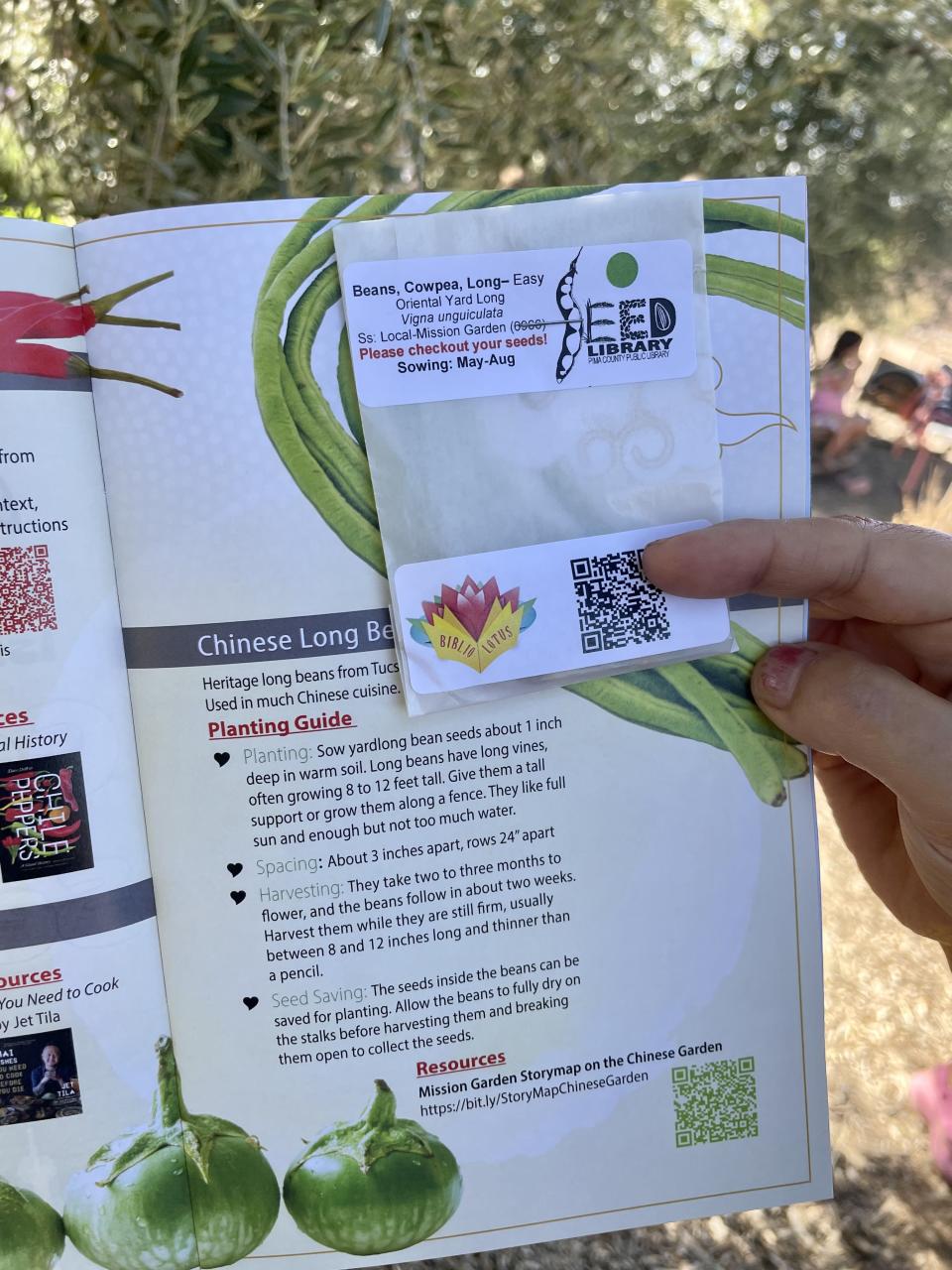
"I think we are resting on the laurels of people and cultures that came before us and took the time and the effort to select and grow, and make them acclimated to this environment," Wilson said, adding that what worked for past generations won't work in the future when the climate changes drastically.
"The environment is changing, and it's actually on us now to continue growing those seeds to continue that success. It weighs heavily on us now."
In her view, seed production from big agricultural companies focuses narrowly on what works to produce a lot of food today, but narrows the "genetic tableau that we have created for the last millennia," and won't adapt as well as heirlooms to the upcoming challenges.
"For me, the sharing of seeds, the growing of seeds, the experimenting of it all is so critical to human survival," Wilson said.
Clara Migoya covers environment issues for The Arizona Republic and azcentral. Send tips or questions to clara.migoya@arizonarepublic.com.
Environmental coverage on azcentral.com and in The Arizona Republic is supported by a grant from the Nina Mason Pulliam Charitable Trust. Follow The Republic environmental reporting team at environment.azcentral.com and @azcenvironment on Facebook, Twitter and Instagram.
You can support environmental journalism in Arizona by subscribing to azcentral today.
This article originally appeared on Arizona Republic: Tucson seed swap helps preserve Chinese foods, traditions

